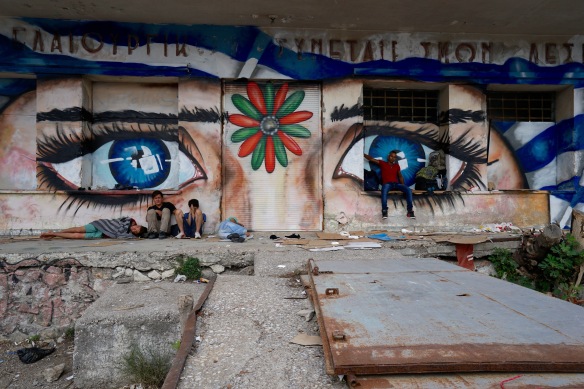 |
A Familiar Stranger
Madhuri Mannava, MBA student

Madhuri Mannava, MBA student
Have you ever taken a walk through the eyes of a stranger? Close your eyes and think about how you would take someone through your life. What would you start with, your childhood, a certain day in your life, or just your daily routine?
Every two seconds, approximately 1 person is forcibly displaced in the world.[1] Worldwide, there are now 68.5 million forcibly displaced humans and this number is growing every day. Every two seconds.
Globally, humans are in need of refuge, they need homes, they need support. However, in the United States, we constantly hear rhetoric that dehumanizes refugees and the administration is refusing to give support. Refusing to give support to mothers, children, fathers, brothers, sisters, grandparents.
During the University of San Francisco’s Academic Global Immersion in Rome, we had the privilege of meeting three refugees, through Centro Astalli and Guide Invisibli, all with captivating and powerful stories. So many times in our lives, especially in the bustling tech world that is San Francisco, we are immersed in the world of data and numbers and we tend to forget the stories of each individual. While data is important to understand the scope of the issue, it can take away from these powerful stories that each person has.
Each of these stories is so important to hear because it gives us a chance to see through the eyes of a refugee, of a fellow human. Something we heard during the AGI trip was that the “refugee crisis is not a humanitarian issue, it’s a solidarity issue.” This is such an important statement. We have the power to stand with our fellow humans and support them, advocate for them, and push for policies that do the same.
When you see articles and news clips showing the President of the United States saying that he will “look Syrian children in the face and say they can’t come,” it is hard to remain optimistic that change is afoot.[2] But change starts here, so continue to share the stories of refugees, vote for more inclusive policies, and take the time and speak to a refugee and hear their story. When you do this, you may learn that they may be a stranger, but they’re more like you than you know. In the end, speaking to one another is what takes us from being strangers to being familiar strangers.
Resources to know more: For more information on what you can do in the Bay Area, visit the following links:
- Refugee Transitions: https://www.reftrans.org/
- Creating education, family engagement, and community leadership opportunities for the San Francisco Bay Area's refugee, immigrant, and asylee newcomer communities since 1982.
- Organization for Refuge, Asylum, and Migration (ORAM): http://oramrefugee.org/
- ORAM specializes in the protection of exceptionally vulnerable refugees, including LGBTI refugees.
- Center for Empowering Refugees and Immigrants (CERI): https://www.cerieastbay.org/
- Center for Empowering Refugees and Immigrants (CERI) is a nonprofit organization based in Oakland with a mission to improve the social, emotional, psychological, economic, and physical health of refugees and immigrant from Southeast Asia affected by war, torture, genocide or other forms of extreme trauma.

References:
#RefugeesWelcome #AGIRome #Solidarity
#RefugeesWelcome #AGIRome #Solidarity
